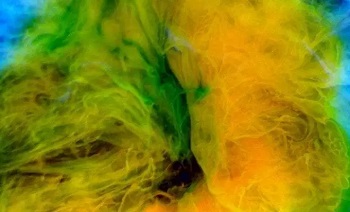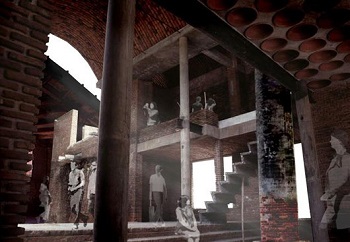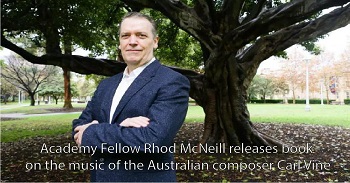Our Newsletter
Queensland Academy of Arts and Sciences creates a newsletter periodically to keep our friends, supporters and followers up-to-date with the activities and events of the academy. It is delivered via our friends email mailing list.
Anyone can subscribe to this mailing list to receive our newsletters as they are released.
To subscribe (or unsubscribe), enter your email address in the box to the right...
Below is a list of all past issues...
July 2023 Newsletter
Fri, 28 Jul 2023Printable version
It has been a few months since my last Newsletter to you. Many of our QAAS colleagues and friends (including Councillors) have chosen to enjoy the northern hemisphere summer to travel overseas. For those about to travel, travelling now or planning future travel, we wish you a safe journey.
Some matters to update you on:
- A Big Dialogue: Net Zero without Nuclear? Don’t forget to purchase tickets (a 10% discount for QAAS members) to this event on Tuesday 8th August at The Tivoli, 52 Costin St., Fortitude Valley. Doors open at 6pm. A reminder email with more information on the event was sent to QAAS members on Thursday 27thJuly at 8.54am. QAAS is pleased to support The Brisbane Dialogues as they present another in their series of thought-provoking series. Tickets can be purchased using the link below:
- QAAS Annual General Meeting: The 2023 AGM is scheduled for Wednesday 6th December 2023 beginning at 5pm. An important part of the AGM is the election of new Councillors. This year we will have a number of vacancies on Council to fill as part of the normal rotation of Councillors’ terms of office. Please reach out to me (president@qldacademy.org.au) if you are interested and would like to discuss this with me.
- QUT and QAAS Data Science in the News Webinar Series: QAAS continues our important collaboration with QUT’s Distinguished Professor Kerrie Mengersen and her colleagues with their QAAS Data Science Webinar Series. The August webinar, scheduled for 25th August from 12noon to 1pm, is to be moderated by Emeritus Professor Roland (Roly) Sussex. Professor Robina Xavier is scheduled to moderate an October webinar on the topic Regenerative AI. We’ll keep you posted on the date for this one also.
- Food for Thought: Emeritus Prof Fred D’Agostino has been in the UK for the last few weeks (he’s a cricket tragic from way back) so his well-liked email to our Fellows containing links to those who are ‘in the news’ has been a little light on. He’s returned from his sojourn now, so feel free to send him details when you notice a news-worthy item to share or you can use the QAAS website email service to keep everyone connected. Fred’s email is peopleandculture@qldacademy.org.au
- Co-opted Councillors: In June this year, the QAAS Council invited four Fellows to join Council through to the end of 2023 to contribute to our interdisciplinary focus across the arts and sciences and develop stronger relationships with regional and remote Queensland. The QAAS Constitution allows for the Academy to enlist Co-opted Councillors for up to a 12-month period. Our co-opted Councillors are listed below and a warm welcome and thanks to them for accepting the invitation to join Council:
- Emeritus Prof Helene Marsh is a Professorial Fellow at James Cook University whose field of expertise is Environmental Science, particularly the ecology and conservation biology of dugongs. Helene is currently the Lead for the Threatened and Migratory Species and Threatened Ecological Communities Mission which is supported through funding from the Australian Government's National Environmental Science Program.
- Professor Mark Western is Professor of Sociology in the Faculty of Humanities and Social Sciences at The University of Queensland and Research Director, The Queensland Commitment, UQ. His research examines how systems of inequality and disadvantage arise and can be addressed. He has a particular focus on social science research methods, solution-oriented social science, social and economic inequality and class analysis.
- Professor Melissa Bull is Director of QUT’s Centre for Justice in the School of Justice (previously from the School Criminology and Criminal Justice at Griffith University). Melissa's two main areas of research include drug regulation and policing diversity and she has published on sentencing and punishment, long term immigration detention and counter terrorism narratives and prevention programs.
- Professor Shazia Sadiq is Professor of Computer Science at the School of Information Technology and Electrical Engineering, The University of Queensland. Shazia’s research focusses on responsible data management and aims to reduce the socio-technical barriers to data driven transformation by assisting organisations to create, protect and sustain agile data pipelines. Her work has contributed to advancing knowledge on data quality management, scalable data curation and cleaning and bias mitigation.
All best wises to you all as always,
Emeritus Prof Helen Chenery
President
Queensland Academy of Arts and Sciences
www.qldacademy.org.au
A Big Dialogue - Net Zero Without Nuclear?
Mon, 17 Jul 2023Printable version
Dear colleagues and friends
QAAS is pleased to support the next Big Dialogue having collaborated with The Brisbane Dialogues on two previous Big Dialogues in 2021 and 2022. The topic for the August Big Dialogue is: Net Zero Without Nuclear?
TBD Convenor and QAAS Honorary Fellow Murray Hancock is offering QAAS members a 10% discount on tickets. The 10% discount is applied at the checkout if you use the link provided below. More information on the event and the link to purchase tickets is in the hyperlink below:
ADVANCE TICKET PURCHASE - Queensland Academy of Arts and Sciences
Join us again for a long form discussion of a big policy topic between differing experts seeking truth and progress, not hollow victory and stalemate.
Date: Tue 8 Aug 2023
Place: The Tivoli, 52 Costin St, Fortitude Valley, Qld 4006
Doors open: 6:00pm until late
Dialogue: 7:00pm until approx 8.45pm
We hope to see you there and please tell everyone about the event.
Emeritus Professor Helen Chenery
PresidentQueensland Academy of Arts and Sciences
www.qldacademy.org.au
April 2023 QAAS Newsletter
Sun, 2 Apr 2023Printable version
I hope the year has started well for you all.
Your Academy has been very busy these last few months on a number of projects.
COVID_19 Round Tables: I have mentioned previously that we planned to convene a series of Round Tables early in 2023 on the topic ‘How should we manage the next pandemic?’. I’m pleased to say that two Round Tables were convened in late February and early March with 19 participants identified from various sectors, industries, backgrounds, educational institutions, states, etc. We were true to the mission of the Academy, namely,
· ‘To provide educational forums for the discussion of issues of major public policy interest to Australia’, and
· ‘To facilitate interaction among disciplines, thereby helping to further those pursuits which benefit Australian society and the broader international community.’
Under the expert moderation of QAAS Fellows Prof Hugh Possingham and The Honourable Justice Sarah Derrington, the participants engaged in a lively, evidence-based and in-depth discussion of how we should manage the next pandemic. Also attending were seven scholars from The University of Queensland’s Liveris Academy who are compiling the report from the two Round Tables under the guidance and supervision of a QAAS-led Editorial Committee. Our plan is to disseminate an e-publication from the Round Tables, and I look to you, our QAAS members, to circulate the report to your contacts, colleagues and collaborators. We hope to be able to send the final report to you in late April or early May.
I’ve attached a list of the Round Table participants to this email for your information. You will note a number of QAAS Fellows in attendance.
QUT and QAAS Data Science Webinar Series: The Academy’s collaboration with QUT’s Centre for Data Science continues into 2023 and the viewing statistics from the last two years (particularly from those who view the recorded event off the website) attest to its continuing popularity and value. By the end of March, two webinars will have already been presented. The link to the two 2023 webinars plus the library of all previous 33 webinars is here.
QAAS will take the lead on two webinars later in the year. Please email me if you have some ideas for topics or, even better, if you would like to coordinate one.
Food for Thought: QAAS Vice President Emeritus Prof Fred D’Agostino continues his engaging series entitled ‘Food for Thought’ when our colleagues are mentioned in the news or elsewhere. You can contribute to this also with interesting news and insights. The email can be sent from the QAAS website and the link is here. Simply click on the box marked Fellows and Members (see below) and type away.
Partnerships and Collaborations: This year, the Academy is looking to create some additional partnerships and collaborations with Universities, Not-for-Profits or charities, Government entities, companies, research institutes, etc whose mission and values align with ours. We envisage that these select partnerships might involve collaborating on events, webinars, editorials, opinion pieces etc. Are you interested or might you like to suggest an entity? Email me and let’s see where we get to. I’d love to hear from you.
QAAS website: We continue to navigate the complicated space around upgrading and enhancing our website. If you have some website or IT skills/knowledge and would like to offer some assistance to Council, it would be greatly appreciated. It is not a huge task – just uploading and editing information and keeping it tidy. Please email me if you’re interested.
All best wishes to you all as always and have a safe and happy Easter break which is nearly upon us.
Emeritus Professor Helen Chenery PhD GAICD FQA
President
Queensland Academy of Arts and Sciences
Art lab: Where art and science collide
Mon, 14 Aug 2017Printable version

Come enjoy art, science and drinks at the Ecosciences Precinct!
The evening begins with drinks and canapes and time to view the sixth Art meets Science Exhibition. Then you can kick back, relax and listen to our panel of artists and scientists discuss where art and science collide.
KEYNOTE: DR GRAHAM BAKER
Graham spent the first six years of his career in engineering practice, in the UK, Oman and Nepal, before embarking on a 30-year career in academe. After teaching and research at Heriot-Watt University Edinburgh, the University of Queensland, and then Warwick University, he returned to Australia as Dean of Engineering and for seven years as Deputy Vice-Chancellor at the University of Southern Queensland. In that role he sponsored research from Public Memory, through climate change and systems biology, to fibre composite materials. At a sector level, Graham built partnerships across Australian Universities, and with institutions in China, the USA and Europe. His own research work covers structural and computational mechanics of materials and structures. He is a Fellow of the Institution of Engineers Australia, a Graduate of the Australian Institute of Company Directors, and Fellow of the Queensland Academy. In addition to his role as President of the Queensland Academy of Arts and Sciences, Graham runs his own consultancy in strategy and innovation. He has held governance positions with Queensland Cyber Infrastructure Foundation and AINSE, and is currently Board Chair of a primary health organisation.
Our panel features:
PROFESSOR ROSS BARNARD
For Professor Ross Barnard, Director of The University of Queensland’s Biotechnology Program, art has been a lifelong interest. According to his mother, Ross drew obsessively as a child, and in 1968 took out first prize for his painting in the primary school art prize. While science would become Ross’ lifelong vocation–his research currently covers infectious diseases, molecular biology and biotechnology–his enthusiasm for art persisted and grew.
DONNA DAVIS
Donna Davis is a multi-discipline artist intrigued with the idea of connection and networks; her work explores the nexus between art and science with a particular focus on natural and social ecologies. Working across sculpture, installation and digital media, Donna captures and creates sites of ecological observation in order to provide new ways of ‘seeing’; creating new connections in the mind of the viewer that may challenge their ecological discourse. She completed her Bachelor of Arts (ART) at Curtin University and has works held in both public and private collections. She has exhibited widely in both solo and selected group exhibitions, and has had her work feature in both state and national touring exhibitions.
SVETLANA TREFILOVA
Svetlana Trefilova is an artist of Russian-Ukrainian origin currently residing in Brisbane, Australia. She has experimented with different media and techniques. Svetlana is a member of the Brisbane Institute of Art and Royal Queensland Art Society (Gold Coast Branch), and regularly displays her work atexhibitions and art events in South-East Queensland. She teaches short courses and workshops at Brisbane Institute of Arts and other Brisbane venues. Svetlana obtained a Master of Arts in Visual Arts with Honours at the Queensland College of Arts (Griffith University, Brisbane) in 2014 and is currently in the second year of her doctoral candidature.
MARIA VANDERGRAGT
Maria originally trained and practiced as a ceramic artist and photographer. Her earlier ceramic work, informed by the patterns and textures of the natural world, is represented in public and private collections throughout Australia. Taking a break from art, Maria then focussed on her work as an environmental scientist. Around ten years ago, Maria returned to drawing and painting, developing a practice using pastels and focusing on Queensland’s landscapes. She enjoys the qualities of pastel as both a drawing and painting medium, its directness and luminosity. Maria’s work as an environmental scientist and the time spent in ‘the bush’ is integral to her art practice.
About the exhibition:
Sixteen artists with recently completed science-based artworks have been invited to exhibit at the sixth Art meets Science Exhibition at the Ecosciences Precinct.
The partner organisations at the Ecosciences Precinct (ESP) Dutton Park hold a number of public and internal events during National Science week. Since 2012, one of these events has been the hosting of an Art meets Science Exhibition. The Exhibitions have proved to be very popular with visitors to the building and the approximately 800 science workers at ESP.
The exhibition opens August 11 and closes September 8.
New Book: The Music of Carl Vine
Sun, 9 Jul 2017Printable version
Evening Lecture
Wed, 4 Jun 2014Printable version

In conjunction with the Queensland Academy of Creative Industries (QACI), QAAS presented the lecture, ‘UQ Architecture Installation at the 13th Venice Biennale’, in August last year in the large public lecture theatre of QACI’s Kelvin Grove campus.
The lecture was delivered by Anupama Kundoo, Michael Dickson, Greg Killen and Chi Tang from The University of Queensland. Over 60 people attended the event, including QACI teachers, students and their parents, as well as QAAS members. Several people stayed for drinks and nibbles afterwards and to meet the brace of lecturers.
Dr Anupama Kundoo was one of about 60 architects from around the world invited to exhibit at the 13th Venice Architecture Biennale in 2012.
Her work is included in the Phaidon World Atlas of Contemporary Architecture, and the Venice Biennale is the prestigious international architecture exhibition.
Anupama’s installation was a full-scale model of part of one of her buildings, Wall House, in India. Wall House combined traditional building materials and techniques with modern architectural and engineering ideas.
Working with her colleagues, Michael Dickson (architect) and Greg Killen (engineer), together with a team of students from UQ (one of whom was Chi Tang), a second team of Indian craftsmen, a helpful Italian architect and, finally, a team of Italian students, the installation was built on site – inside an old arsenal – in Venice, just in time for the opening of the Biennale.
How the team marshalled the necessary materials (including, in the end, paper coffee cups), overcame the structural limitations
of the old arsenal building and managed the logistics of the whole exercise (Italy shuts down for part of the summer and there is no Bunnings just around the corner) amounted to a minor miracle.
One of the most interesting aspects of the lecture was their account of how students took on decision-making and instructional roles that would traditionally have been the province of their teachers. In its review of the Biennale, The New York Times made some critical remarks about the exhibition, but it singled out Wall House as one of the “gems”.


